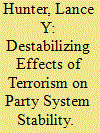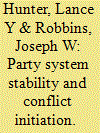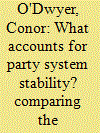| Srl | Item |
| 1 |
ID:
159903


|
|
|
|
|
| Summary/Abstract |
In democracies with stable party systems, voters can more easily trace policy decisions from parties and representatives within the government to specific policy outcomes. Consequently, party system stability (PSS) has been reportedly linked to a variety of factors including economic conditions, democratic performance, political institutions, and socioeconomic cleavages. While informative, these lessons offer precious little insight into other factors that can destabilize a party system. In this work, we surmise that terrorist attacks have important implications for two commonly used measures of PSS. The results of a pooled, cross-sectional time series analysis confirm our hypothesis: deadly attacks proximate to elections destabilize party systems, even when controlling for multiple standard controls. In addition, the level of democratic consolidation within states also influences the degree that fatal terrorist attacks affect party system stability. These findings are based on terrorism data collected from the Global Terrorism Database and from PSS data compiled by the authors.
|
|
|
|
|
|
|
|
|
|
|
|
|
|
|
|
| 2 |
ID:
153881


|
|
|
|
|
| Summary/Abstract |
The study of interstate conflict has yielded a voluminous literature to date, yet much of the recent work has only just begun to underscore the importance of domestic factors in predicting conflict initiation in democracies. In short, some of these studies find that when electoral accountability is greater—measured in a variety of ways—interstate conflict becomes less likely. Despite this burgeoning literature, scholars have spent far less time analysing the role linkage institutions, such as stable party systems, have played in foreign policy discussions. To address this gap, we argue that in more stable party systems conflict initiation becomes less likely due to the greater accountability present in these systems. This conjecture is supported by the results of a time-series cross-sectional analysis of 48 democracies from 1978 to 2000 that uses multiple measures of conflict initiation and party system stability.
|
|
|
|
|
|
|
|
|
|
|
|
|
|
|
|
| 3 |
ID:
193267


|
|
|
|
|
| Summary/Abstract |
The party system literature has generally paid little attention to whether traditional beliefs have any impact on voters’ electoral behavior and the stability of party systems. The purpose of the present study shows that the stability of party systems and the pervasiveness of traditional beliefs go hand-in-hand. This article is expected to advance the scholarly understanding of the political consequences of traditional beliefs by showing that voters who hold traditional beliefs or engage in traditional practices are not simply less likely to have pro-democratic attitudes or have a greater appreciation of dictatorial rule, but also more likely to vote for ruling parties in elections. The evidence presented in the article sustains a basic claim; namely, that the pervasiveness of traditional beliefs in Togolese society should be regarded as one of the determinants of the party system's stability.
|
|
|
|
|
|
|
|
|
|
|
|
|
|
|
|
| 4 |
ID:
131148


|
|
|
|
|
| Publication |
2014.
|
| Summary/Abstract |
Why do party systems stabilise quickly in some new democracies while others remain in extended flux? As a core variable of comparative politics, party system stability has led scholars to generate various theoretical explanations, but consensus is still lacking. Given its widely divergent party systems, postcommunist Europe presents an important opportunity to revisit stability's determinants. Applying hypotheses derived from theories about competition in multidimensional policy spaces, I find that they better explain variation in a 14-case sample than contending hypotheses about the electoral system, economic performance, constitutional design, political culture, or previous democratic experience.
|
|
|
|
|
|
|
|
|
|
|
|
|
|
|
|